High security a fact of life for UK’s Jews living in fear of attack
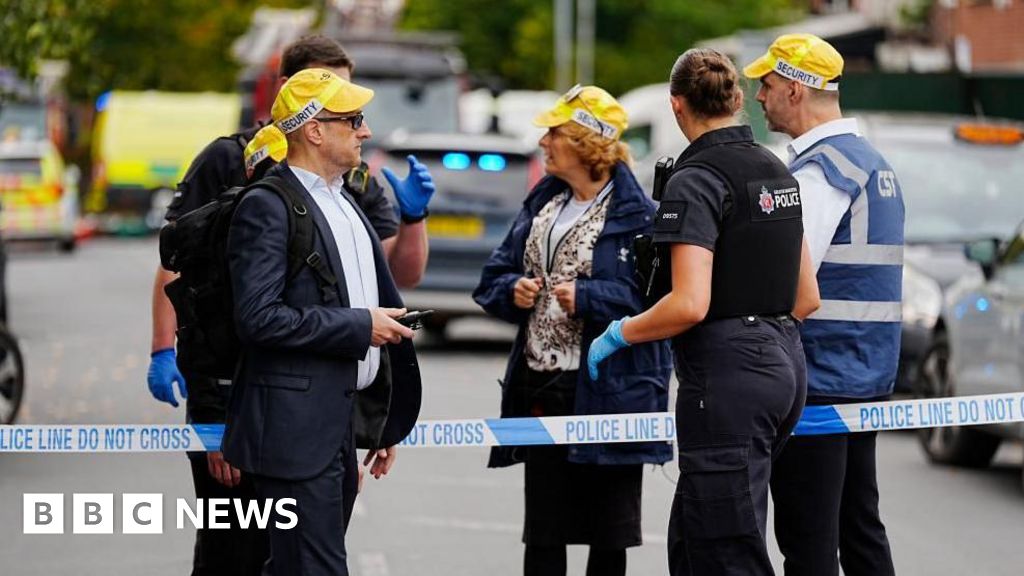
Paul KirbyEurope digital editor and
Lucy ManningSpecial correspondent
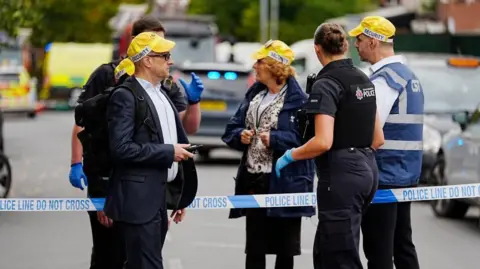 Peter Byrne/PA Wire
Peter Byrne/PA WireWhen a Manchester synagogue came under attack last week, it was a 78-year-old volunteer security guard who raised the alarm with police.
And it was community volunteers and private security guards who held back the doors against the assailant, after he rammed the gates with a car and then attacked worshippers with a knife. Adrian Daulby and Melvin Cravitz were killed – one was a volunteer, the other a security guard – while three others were seriously injured.
High security has been a feature of Jewish life at synagogues, schools and other institutions in the UK for decades and much of it has been provided by members drawn from across the community.
As antisemitic attacks hit record levels in the UK after the 7 October 2023 Hamas attacks on Israel that began the war in Gaza, many British Jews stepped up training and their community co-ordinated more closely with police.
One rabbi told the BBC it was not a matter of whether a deadly attack was going to happen – it was a matter of where. And it happened in Crumpsall last Thursday, on the most solemn day in the Jewish calendar.
Community leaders in the UK’s tight-knit Jewish population of about 300,000 are now asking what more can be done to keep their institutions safe.
The chief constable of Greater Manchester Police, Sir Stephen Watson, told the BBC that his force had “very significantly” stepped up patrols, but he acknowledged that level could not be maintained forever.
Jewish leaders have called for a stronger response from the government, not just extra layers of security.
“Our fears and concerns have regularly been diminished and not acted upon,” says Marc Levy, head of Greater Manchester’s Jewish Representative Council.
Volunteer guards in stab-proof vests
Mr Levy’s father was on security at the time of the attack and helped barricade the door. He only found out his father was safe when he saw him live on TV.
Members of Heaton Park synagogue regularly do shifts as part of the charity the Community Security Trust (CST). One of those wounded on Thursday was volunteering for the charity.
“We’re used to having high fences and security guards; we don’t really think twice about it,” says one member of the Heaton Park community.
The CST works in tandem with local police forces and has been widely praised for its role in safeguarding Jewish buildings across the country. Volunteers routinely wear stab-proof vests.
“Police will never have the resources to protect every Jewish building, so we have this partnership providing collectively a security infrastructure for the Jewish community which sadly has been in place for many years,” says director of policy Dave Rich.
In parts of London, another group called Shomrim provides patrols in Orthodox Jewish areas.
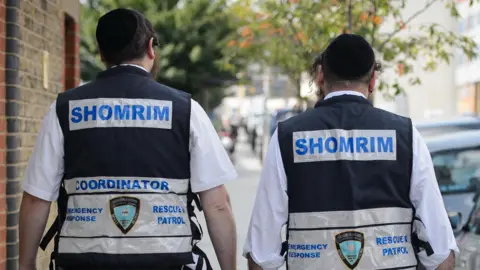 Leon Neal/AFP
Leon Neal/AFPFrance and the US have also seen deadly attacks in recent years: on a Jewish school in Toulouse in 2012, a Jewish supermarket in Paris in 2015, and a synagogue in Pittsburgh, Pennsylvania, in 2018.
In the wake of the Manchester attacks, French Interior Minister Bruno Retailleau has called on the police force to provide “all available means to ensure a visible presence”.
With a population of about half a million, France is home to the biggest Jewish community in Europe and armed police regularly stand outside schools and synagogues.
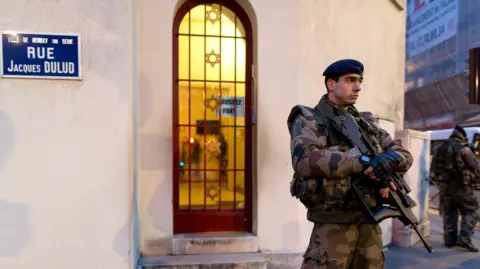 Kenzo Tribouillard/AFP
Kenzo Tribouillard/AFP“We are used to having police in front of synagogues and schools. We have even had them sleeping inside them in 2015,” says Robert Ejnes, executive head of the Representative Council of French Jewish Institutions (Crif), who has praised the support of successive French governments.
“The level of threat has increased so much that every Jewish family is worried for their children when they go outside, especially if they wear a kippah (head-covering) and a Magen David (Star of David). It’s probably at the highest level ever known.”
Backdrop of rise in antisemitic attacks in UK
The CST recorded 1,521 antisemitic incidents in the UK in the first half of 2025. Of those, it says 51% “referenced or were linked” to Israel, the Hamas attack or the war in Gaza. Only the first six months of 2024 have been worse.
Greater Manchester Police recorded 446 incidents in the year to September 2024, a steep rise on the previous year.
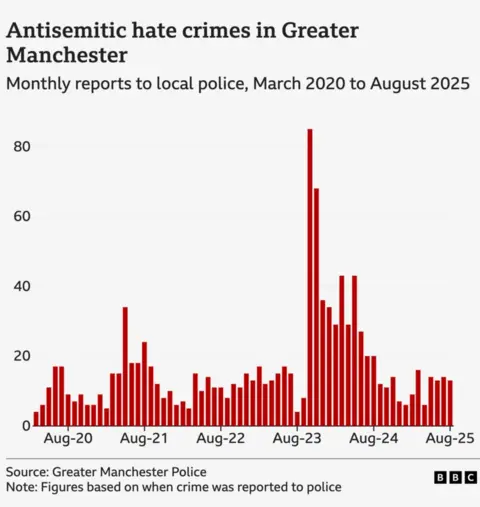
Claudia Mendoza, the head of the Jewish Leadership Council, believes there has been a failure by successive governments in the UK to confront violent jihadist language and tackle antisemitic hate.
“I don’t know how you put the genie back in the bottle but the issue is among us and we can’t row back,” she says.
She has spoken to both Britain’s prime minister and communities secretary since last week’s attack and believes they both listened to her call for action.
What do you tell a nine-year-old?
Rabbi Albert Chait, who heads the Leeds United Hebrew Congregation, says he has never seen his children so scared as after the Manchester attack. He says his nine-year-old daughter was “physically shaking with fear”.
“Daddy why do they hate the Jews?” he says she asked him.
The rabbi knows the Heaton Park community well – including Mr Cravitz who was married to the mother of one of his oldest friends.
In north London, Amanda, whose parents live in Manchester, had to make a decision on the day after the attack about whether or not to send her daughters to their Jewish school, JFS.
When the headteacher sent a message to parents promising beefed-up security, she said she “felt reassured”.
‘We’re not going anywhere’
Many Jewish leaders have urged their communities to react with defiance.
“Show we are not cowed. As Jews we always rebuild. We always recover, we always return stronger,” Rabbi Daniel Walker said after the attack on his synagogue.
Jonathan Wittenberg, senior rabbi of the Masorti strand of modern-traditional Judaism, was also positive: “Judaism is a deeply resilient religion.”
But many Jews have been asking what future they have in the UK when the solutions they say they are offered do not address what they see as the root cause of antisemitism.
“My younger one said ‘Do you think we should move?'” Amanda says. “But I don’t think we could. I feel really sad and unsettled and both my daughters do.”
In north Manchester, Raphi Bloom’s answer is definitive: “We’re not going anywhere, we’re not Jews with trembling knees, we are proud Mancunian Jews.”
Dave Rich of the CST told the BBC that since Thursday’s attack they had seen a large number of Jewish people coming to their website to become volunteers. “That’s not a sign of running away,” he says.
In Leeds, Rabbi Albert Chait told his congregation on social media that “this Shabbat you have every excuse not to go [to synagogue], but you have also every excuse to go. Don’t let them win.”
One mother told the BBC that when her young daughter asked her if it was still safe for Jews to live in the UK, she reminded her of an old Hebrew song.
“The whole world is a very narrow bridge, and the main thing is to have no fear at all.”
Source link


